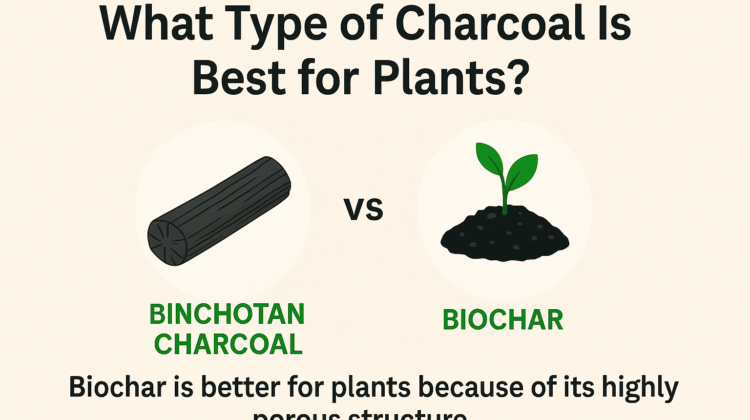
When it comes to enriching soil and supporting healthy plant growth, many gardeners and farmers ask: Should I use biochar or binchotan charcoal? While both are carbon-based materials created through pyrolysis, they have different properties, purposes, and benefits. If your goal is better soil, stronger roots, and thriving plants, biochar is the superior choice—and here’s why.
🧪 What Is Biochar?
Biochar is a fine-grained charcoal made by burning organic materials (biomass) like crop waste, wood chips, or coconut husks under low-oxygen conditions. Unlike ordinary charcoal, biochar is purpose-built for soil health.
🧱 What Is Binchotan Charcoal?
Binchotan is a traditional Japanese hardwood charcoal, mainly used for purifying water, removing odors, and sometimes decorating terrariums. It’s very dense, long-lasting, and made by firing oak at high temperatures. While it has some porous qualities, it isn’t optimized for soil use.
🔍 Key Benefits of Biochar for Plants
1. Improves Soil Structure
Biochar has a honeycomb-like structure that helps break up compacted soil, improving root penetration and aeration. It also keeps clay soils from becoming waterlogged.
2. Retains Moisture
In dry or sandy soils, biochar works like a sponge—absorbing water and slowly releasing it, reducing the need for frequent watering.
3. Increases Nutrient Availability
Thanks to its high cation exchange capacity (CEC), biochar holds onto nutrients like nitrogen, potassium, and phosphorus. This means plants get more from fertilizers, and less is wasted through leaching.
4. Boosts Microbial Life
Biochar offers countless tiny spaces where beneficial microbes and fungi can thrive. These microorganisms help plants absorb nutrients and protect roots from disease.
5. Balances Soil pH
Many acidic soils benefit from biochar’s mild alkalinity, helping you grow plants that otherwise would struggle.
6. Reduces Soil Toxins
Biochar can trap heavy metals, pesticides, and pollutants, preventing them from being taken up by plants.
7. Environmentally Friendly
Biochar is a form of carbon sequestration. It locks carbon into the ground for hundreds to thousands of years, helping to reduce greenhouse gases in the atmosphere.
Read More: Liposuction Grass & Lyposingrass: Nature’s Slimming Secret or Marketing Myth
🚫 Why Binchotan Isn’t Ideal for Plants
Even though binchotan is clean, pure, and long-lasting, it wasn’t made with soil health in mind. Here’s what limits its value in gardening:
- Less Porous: Binchotan’s dense structure means it holds less water and fewer nutrients.
- No Microbial Habitat: Unlike biochar, it doesn’t provide enough surface area for microorganisms.
- Hard to Break Down: It’s very durable, which is excellent for water filtration, but not for quick soil improvements.
- More Expensive: Binchotan is a premium product. Using it in large volumes for soil is costly and unnecessary.
🛠 How to Use Biochar Effectively
To get the full benefit of biochar, follow these steps:
✅ 1. Charge the Biochar
Raw biochar can absorb nutrients from the soil, which temporarily reduces availability to plants. To avoid this, “charge” the biochar by mixing it with compost, worm tea, or liquid fertilizer before adding it to the soil.
✅ 2. Mix It Into the Soil
Blend 5–10% biochar into your soil by volume. For raised beds or pots, mix it thoroughly into the top 6–8 inches.
✅ 3. Use with Compost or Manure
Combining biochar with organic matter gives you the best of both worlds: instant nutrient boost from compost and long-term retention from biochar.
🌿 Ideal Use Cases for Biochar
- Vegetable gardens
- Indoor plants & pots
- Fruit trees
- Lawns & turfgrass
- Greenhouses and hydroponics
💡 Bonus Tips for Maximum Plant Health
- Use certified biochar that’s free from contaminants (look for IBI or EBC certification).
- Avoid charcoal briquettes or BBQ coals—they may contain chemicals harmful to plants.
- Combine biochar with cover crops or compost tea for added microbial diversity.
📊 Biochar vs. Binchotan Charcoal – Quick Comparison Table
| Feature | Biochar | Binchotan Charcoal |
| Purpose | Soil amendment | Water purification |
| Porosity | Very high | Low to moderate |
| Microbial support | Excellent | Minimal |
| Water retention | High | Low |
| Nutrient retention (CEC) | High | Very low |
| Soil pH effect | Neutral to alkaline | Neutral |
| Environmental benefit | Carbon sequestration | Minimal |
| Cost | Affordable (bulk use) | Expensive |
| Best for plants? | ✅ Yes | ❌ Not ideal |
🛒 Where to Get Biochar?
Look for organic or locally sourced biochar that has been tested for agricultural use. Many companies now offer pre-charged biochar or blends with compost.
Pro tip: Some gardeners even make their own using a retort kiln and garden waste!
🧠 Final Thoughts
If you’re serious about improving plant health, conserving water, reducing fertilizer use, and making your soil thrive for years to come, biochar is your best ally. While binchotan charcoal may look attractive and serve well in air or water filtration, it simply doesn’t offer the comprehensive plant-growing advantages of biochar.

Leave a Reply